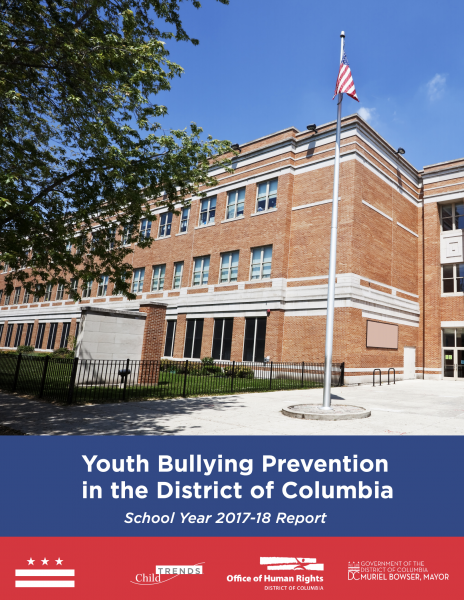 The District of Columbia Office of Human Rights (OHR), in partnership with Child Trends, issued the Citywide Youth Bullying Prevention Program's third report on the state of bullying in District public and public charter schools during the 2017-2018 school year. The Youth Bullying Prevention Act of 2012 requires schools and other youth-serving agencies including, but not limited to, government agencies, libraries, non-profits, and community centers) to adopt comprehensive anti-bullying policies, implement thorough reporting and investigation procedures, provide training for staff, and maintain and report incident data.
The District of Columbia Office of Human Rights (OHR), in partnership with Child Trends, issued the Citywide Youth Bullying Prevention Program's third report on the state of bullying in District public and public charter schools during the 2017-2018 school year. The Youth Bullying Prevention Act of 2012 requires schools and other youth-serving agencies including, but not limited to, government agencies, libraries, non-profits, and community centers) to adopt comprehensive anti-bullying policies, implement thorough reporting and investigation procedures, provide training for staff, and maintain and report incident data.
As of the close of school year (SY) 2017-2018, all local education agencies (LEA) in the District have adopted a compliant bullying prevention policy, except for two brand new schools that opened at the onset of the SY 2018-2019. This report highlights the work that OHR has done since the Youth Bullying Prevention Act (YPBA) was passed in 2012, making evidence-based recommendations, publishing citywide bullying data, outlining key findings and priority areas, and providing a detailed summary of each educational institution’s engagement with the YBPA.
Highlights of findings include:
- Full implementation of the YBPA’s four requirements remains a challenge for most schools. Nearly half of schools (47 percent) report not providing staff training around the YBPA, and more than half report either that their bullying policy is not on the school’s website, or they do not know if it is (56 percent). Although 98 percent of schools responded to the annual YBPA data request, nearly a third (30 percent) did not provide data on bullying incidents. Overall, only 16 percent of District schools are fully implementing all requirements of the YBPA.
- Rates of reported incidents on the 2015-16 Civil Rights Data Collection and the 2018 YBPA Data Collection were significantly lower than self-reported rates on the Youth Risk Behavior Survey. The CRDC data indicate a rate of 2.5 reports of bullying for every 1000 students, while the YBPA data indicate a rate of 25 reports for every 1000 students among schools that provided incident data.
- Pilot school climate data show considerable variation across schools’ strengths and needs. School climate data collected from 19 schools as part of the ongoing Improving School Climate in DC project show that while participating schools generally have favorable school climates, there is room for improvement on specific aspects of school climate and for certain subgroups (e.g., transgender students), which vary across schools.


